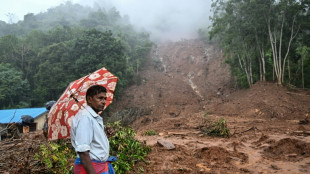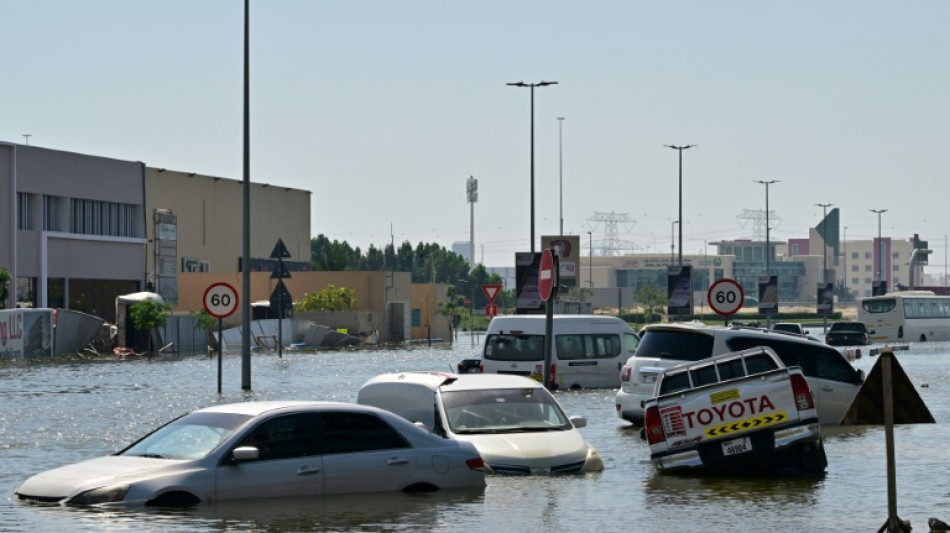
-
 Sabalenka wants 'Battle of the Sexes' rematch and revenge
Sabalenka wants 'Battle of the Sexes' rematch and revenge
-
Osaka drawing inspiration from family at United Cup

-
 Leftist Mamdani takes over as New York mayor under Trump shadow
Leftist Mamdani takes over as New York mayor under Trump shadow
-
Israel's Netanyahu among partygoers at Trump's New Year's Eve fete

-
 Champagnie, Wemby lead Spurs comeback in Knicks thriller
Champagnie, Wemby lead Spurs comeback in Knicks thriller
-
Eight dead in US strikes on alleged drug boats: US military

-
 Trump joins criticism of Clooney's French passport
Trump joins criticism of Clooney's French passport
-
AI, chips boom sent South Korea exports soaring in 2025

-
 Taiwan's president vows to defend sovereignty after China drills
Taiwan's president vows to defend sovereignty after China drills
-
N. Korea's Kim hails 'invincible alliance' with Russia in New Year's letter

-
 In Venezuela, price of US dollar up 479 percent in a year
In Venezuela, price of US dollar up 479 percent in a year
-
Cummins, Hazlewood in spin-heavy Australia squad for T20 World Cup

-
 Ex-boxing champ Joshua discharged from hospital after fatal car crash
Ex-boxing champ Joshua discharged from hospital after fatal car crash
-
Zelensky says deal to end war '10 percent' away

-
 Trump bashes Clooney after actor becomes French
Trump bashes Clooney after actor becomes French
-
We are '10 percent' away from peace, Zelensky tells Ukrainians

-
 Trump says pulling National Guard from three cities -- for now
Trump says pulling National Guard from three cities -- for now
-
Ivory Coast top AFCON group ahead of Cameroon, Algeria win again

-
 World welcomes 2026 after a year of Trump, truces and turmoil
World welcomes 2026 after a year of Trump, truces and turmoil
-
Ivory Coast fight back to pip Cameroon for top spot in AFCON group

-
 Second Patriots player facing assault charge
Second Patriots player facing assault charge
-
Trump-hosted Kennedy Center awards gala ratings plummet

-
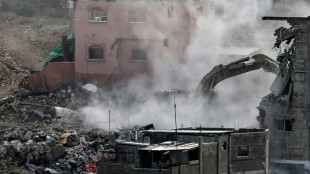 Israel begins demolishing 25 buildings in West Bank camp
Israel begins demolishing 25 buildings in West Bank camp
-
Cambodian soldiers freed by Thailand receive hero's welcome

-
 Sudan lose to Burkina Faso as Algeria win again at Cup of Nations
Sudan lose to Burkina Faso as Algeria win again at Cup of Nations
-
Man City's Rodri and Doku could return against Sunderland

-
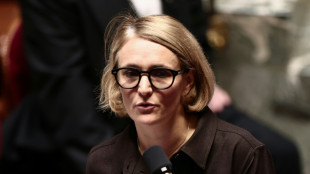 French minister criticises Clooney's 'double standard' passport
French minister criticises Clooney's 'double standard' passport
-
Ukrainians wish for peace in 2026 -- and no more power cuts

-
 Glasner coy over Palace pursuit of Spurs striker Johnson
Glasner coy over Palace pursuit of Spurs striker Johnson
-
Neville labels Man Utd's draw with Wolves 'baddest of the bad'

-
 Stocks pull lower at end of record year for markets
Stocks pull lower at end of record year for markets
-
France plans social media ban for children under 15

-
 Mbappe suffers knee sprain in blow for Real Madrid
Mbappe suffers knee sprain in blow for Real Madrid
-
Putin wishes Russians victory in Ukraine in New Year speech

-
 Iran government building attacked as top prosecutor responds to protests
Iran government building attacked as top prosecutor responds to protests
-
World begins to welcome 2026 after a year of Trump, truces and turmoil

-
 Fofana reckons 'small details' restricting Chelsea's progress
Fofana reckons 'small details' restricting Chelsea's progress
-
Israel to ban 37 aid groups operating in Gaza
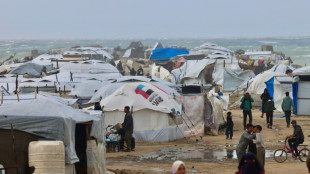
-
 Filmmaker Panahi says Iran protests 'to move history forward'
Filmmaker Panahi says Iran protests 'to move history forward'
-
Xi says China to hit 2025 growth target of 'around 5 percent'

-
 Turkey steps up anti-IS raids, arresting 125 suspects
Turkey steps up anti-IS raids, arresting 125 suspects
-
Arteta says Arsenal reaping rewards for 'sacrifices and commitment'

-
 China says live-fire drills around Taiwan 'completed successfully'
China says live-fire drills around Taiwan 'completed successfully'
-
Nancy adamant he's still the man for Celtic job after Motherwell defeat

-
 Hoping for better year ahead, Gazans bid farewell to 'nightmare' of 2025
Hoping for better year ahead, Gazans bid farewell to 'nightmare' of 2025
-
Queen Camilla recalls fighting back against train attacker

-
 Stocks drop at end of record year for markets
Stocks drop at end of record year for markets
-
Amorim still 'really confident' about Man Utd potential despite Wolves draw

-
 Berlin says decision postponed on European fighter jet
Berlin says decision postponed on European fighter jet
-
Iran prosecutor pledges 'decisive' response if protests destabilise country

| SCS | 0.12% | 16.14 | $ | |
| RBGPF | -0.37% | 80.75 | $ | |
| CMSD | 0.09% | 23.15 | $ | |
| BCC | -0.26% | 73.6 | $ | |
| NGG | -0.54% | 77.35 | $ | |
| JRI | 0.22% | 13.61 | $ | |
| BCE | 1.05% | 23.82 | $ | |
| RYCEF | 0.13% | 15.51 | $ | |
| CMSC | -0.15% | 22.65 | $ | |
| RELX | -1.71% | 40.42 | $ | |
| RIO | -0.61% | 80.03 | $ | |
| GSK | -0.53% | 49.04 | $ | |
| AZN | -0.63% | 91.93 | $ | |
| BP | -0.06% | 34.73 | $ | |
| VOD | -0.15% | 13.21 | $ | |
| BTI | 0.12% | 56.62 | $ |

Oman, UAE deluge 'most likely' linked to climate change: scientists
Global warming caused by fossil fuel emissions "most likely" exacerbated the intense rains that lashed the UAE and Oman last week, causing deaths and widespread flooding, an expert group of scientists said Thursday.
Extreme rainfall in El Nino years has become 10-40 percent heavier in the region affected, a study published by the World Weather Attribution (WWA) group found.
Climate change caused by fossil fuel emissions is the probable reason but cannot be pinpointed "with certainty", added the study compiled by 21 international researchers.
Twenty-one people died in Oman and four in the United Arab Emirates, which was battered by the heaviest rainfall since records began for the desert Gulf state 75 years ago.
"Warming, caused by burning fossil fuels, is the most likely explanation for the increasing rainfall," WWA said in the study.
"There are no other known explanations" for the sharp rise in precipitation, added the international group of scientists that investigates the role of climate change in extreme weather events.
The UAE and Oman are oil-producing states already suffering extreme heat brought on by global warming. But last week's floods revealed the additional risk of exceptional weather events as the planet heats up.
"The UAE and Oman floods have shown that even dry regions can be strongly affected by precipitation events, a threat that is increasing with increasing global warming due to fossil fuel burning," said Sonia Seneviratne, a WWA member and professor at Zurich's ETH university.
- Severe disruption -
The WWA study analysed historic weather data and climate models to determine changes in rainfall patterns in the area, including in El Nino years -- a recurring pattern when global temperatures rise.
It found extreme rains were significantly less intense in the years before 1.2 degrees Celsius of warming above pre-industrial levels.
"Extreme rainfall events have become at least 10 percent heavier in the UAE and Oman," said Mariam Zachariah, a WWA member and researcher at London's Imperial College.
"This finding... agrees with the basic physics that a warmer atmosphere can hold more moisture."
The storm first landed in Oman on April 14, killing at least 21 people in flash floods and other incidents, according to the official Oman News Agency.
It hit the UAE on April 16, dumping nearly two years' worth of rain that flooded homes, roads, malls and offices and left four people dead.
Financial hub Dubai, carefully marketed as a centre for glamour and luxury, faced severe disruption for days with major roads blocked by floods, power outages and some residents trapped in their homes.
Dubai airport, the world's busiest by international travellers, cancelled 2,155 flights, diverted 115 and did not return to full capacity until Tuesday.
"The situation was unprecedented in its severity but we are a country that learns from every experience," Dubai ruler and UAE Prime Minister Sheikh Mohammed bin Rashid al-Maktoum said on Wednesday, announcing a $544 million package to repair homes.
- 'Destructive floods' -
Reports of cloud seeding, the practice of spraying clouds with chemicals to increase rainfall, were denied by UAE officials last week.
The WWA said it did not investigate "the possible influence of cloud seeding" but added: "Given the huge size of the storm system, massive rainfall would have fallen regardless of whether (cloud seeding) operations had been carried out."
The UAE last year hosted the United Nation's COP28 climate talks, during which nations reached a landmark agreement to "transition away" from fossil fuels.
Both the UAE and Oman are investing in renewable energy and have pledged to decarbonise their domestic economies -- excluding the fossil fuels they sell abroad.
But like other oil producers including the United States, they are building up their capacities to cater for an expected rise in demand.
"At COP28 in Dubai, the world agreed to 'transition away' from fossil fuels. Nearly half a year later, countries are still opening new oil and gas fields," said Friederike Otto, a climatologist and WWA member.
"If the world keeps burning fossil fuels, rainfall in many regions of the world will get heavier and heavier, resulting in deadlier and more destructive floods."
L.Miller--AMWN

